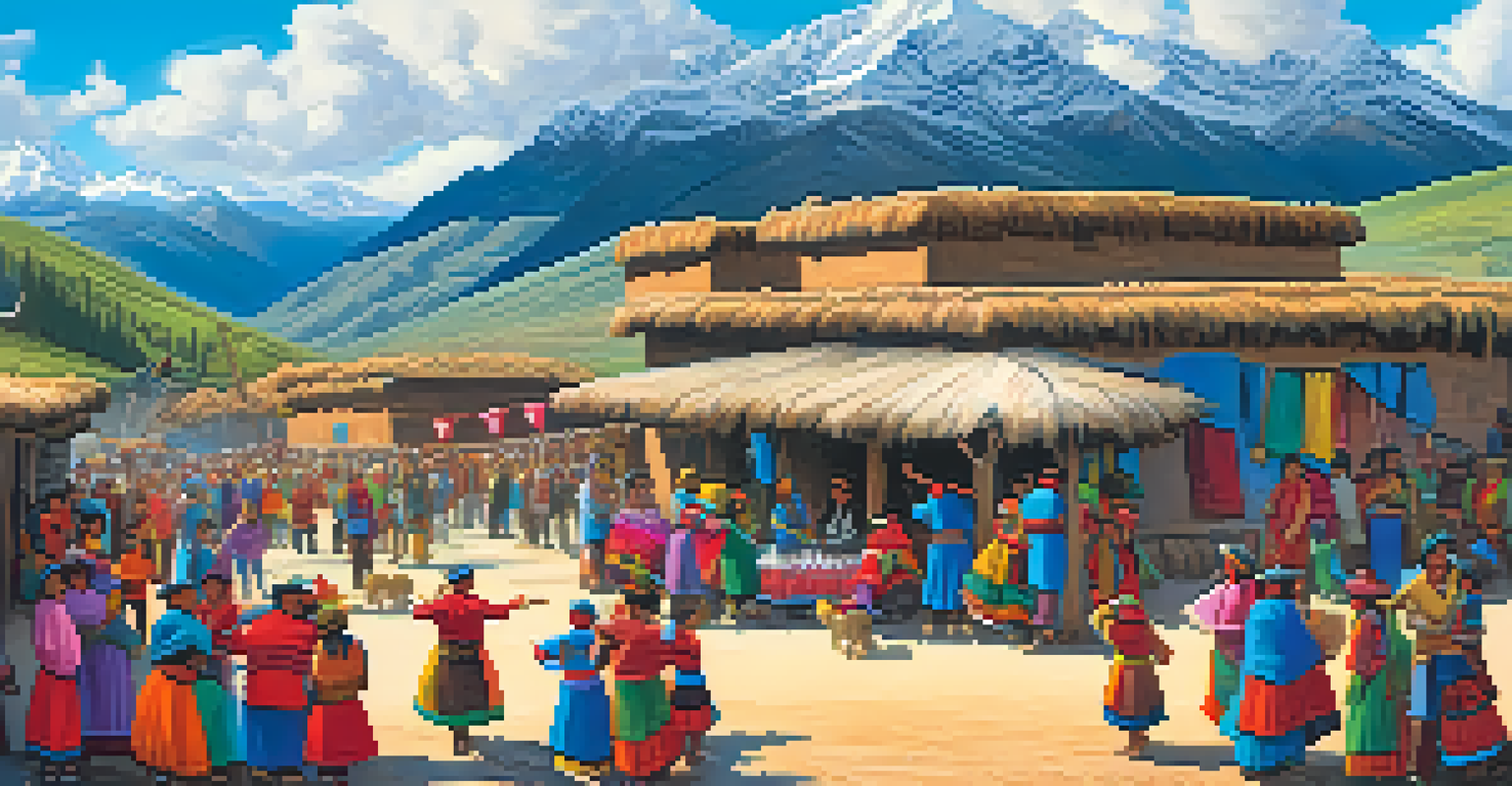The Influence of José María Arguedas on Andean Narratives

Understanding José María Arguedas: A Literary Pioneer
José María Arguedas was a groundbreaking Peruvian writer whose works profoundly influenced Andean literature. Born in 1911, he grew up in a bilingual environment, immersing himself in both Spanish and indigenous languages. This unique background allowed him to weave rich narratives that reflected the complexities of Andean culture and identity. His ability to bridge cultures made his storytelling resonate with diverse audiences.
Literature is a way of knowing, a way to understand the world and our place in it.
Arguedas’ experiences as a mestizo—someone of mixed Indigenous and European heritage—shaped his worldview and, subsequently, his writing. He often explored themes of identity, cultural conflict, and the struggle for social justice through his characters. This authenticity is what made his works relatable and impactful, effectively capturing the essence of Andean life.
His literary legacy is marked by a deep respect for indigenous traditions and an unyielding commitment to portraying their struggles. Arguedas believed that literature had the power to challenge societal norms, and he used his voice to advocate for the marginalized. This commitment continues to inspire contemporary writers in the Andes.
The Fusion of Cultures in Arguedas' Work
One of the most striking features of Arguedas' narratives is the fusion of indigenous and Spanish cultures. He often employed Quechua phrases and idioms alongside Spanish prose, creating a linguistic tapestry that reflects the multicultural reality of Peru. This blending not only enriches his storytelling but also serves to validate indigenous languages as vital components of the literary canon.

In novels like 'Los Ríos Profundos,' Arguedas illustrates the tensions and synergies between the two cultures. His characters often find themselves at the intersection of these worlds, grappling with their identities in a rapidly changing society. This internal conflict mirrors the broader societal struggles faced by many Peruvians, making his work resonate with readers from various backgrounds.
Cultural Fusion in Arguedas' Works
José María Arguedas masterfully blends indigenous and Spanish cultures in his narratives, reflecting the multicultural reality of Peru.
Moreover, Arguedas' approach to cultural fusion highlights the importance of coexistence and mutual understanding. By showcasing the beauty and complexity of both indigenous and mestizo identities, he invites readers to embrace diversity. This theme remains relevant today, as societies around the globe continue to navigate cultural intersections.
Arguedas and the Representation of Indigenous Voices
Arguedas was a champion for indigenous voices, often portraying them with authenticity and depth. He believed that literature could serve as a platform for marginalized communities, shedding light on their experiences and struggles. By centering indigenous characters in his narratives, he challenged dominant narratives that often sidelined these voices.
We must learn to see the world through the eyes of others, to understand the richness of our differences.
His commitment to representing indigenous culture is particularly evident in works like 'El Sexto,' where he explores the life of a young indigenous man navigating a world that often disregards his existence. Through this lens, Arguedas not only tells a story but also invites readers to empathize with the realities faced by indigenous people. This empathetic approach is crucial in fostering understanding and respect for diverse cultures.
Moreover, Arguedas’ writing style—rich in symbolism and emotional depth—allows readers to connect with the characters on a personal level. His portrayal of indigenous life is not romanticized; instead, it reflects both the beauty and the hardships of their existence. This authenticity has paved the way for future writers to continue amplifying indigenous narratives.
The Role of Nature in Arguedas' Narratives
In many of his works, nature plays a pivotal role, often serving as a character in its own right. Arguedas had a profound connection to the Andean landscape, which he described with vivid detail and reverence. This relationship underscores the importance of nature in shaping cultural identity and the spiritual beliefs of indigenous communities.
For instance, in 'Los Ríos Profundos,' rivers and mountains are not merely backdrops; they are integral to the characters’ lives and struggles. The natural world reflects their emotions and experiences, highlighting the deep interconnection between people and their environment. This perspective encourages readers to consider the broader implications of environmental stewardship.
Championing Indigenous Voices
Arguedas authentically represents indigenous experiences, challenging dominant narratives and fostering empathy through his storytelling.
Arguedas’ emphasis on nature also serves as a reminder of the cultural significance of the Andean landscape. By portraying it as a living entity intertwined with human existence, he challenges the notion of nature as a resource to be exploited. Instead, he presents it as a source of wisdom and inspiration, urging readers to respect and cherish the natural world.
Exploring Themes of Identity and Belonging
Identity is a recurring theme in Arguedas' literature, often depicted through the lenses of race, culture, and social class. His characters frequently grapple with their sense of belonging in a society that can be both beautiful and brutal. This exploration of identity reflects the complexities of being mestizo in a world defined by rigid cultural boundaries.
In his stories, Arguedas illustrates how personal and collective identities are shaped by history and experience. For example, characters might feel torn between their indigenous roots and the pressures of modernity, leading to inner turmoil. This struggle is emblematic of the broader quest for identity faced by many in contemporary societies, making his work timeless and universally relatable.
Furthermore, Arguedas’ narratives often highlight the importance of community in shaping identity. Through shared experiences and collective memory, characters find strength and resilience. This sense of belonging is a vital aspect of indigenous culture, reminding readers of the power of community in navigating the complexities of life.
The Legacy of Arguedas in Contemporary Literature
José María Arguedas' influence extends far beyond his lifetime, leaving an indelible mark on contemporary Andean literature. Many modern writers draw inspiration from his themes of identity, cultural fusion, and social justice. His commitment to representing indigenous voices continues to resonate, as new authors strive to amplify marginalized narratives.
In recent years, there has been a resurgence of interest in Andean literature, with writers revisiting Arguedas' works and exploring similar themes. This revival speaks to the enduring relevance of his messages in today's world, where issues of identity and cultural representation are more crucial than ever. New authors are reinterpreting his legacy, bringing fresh perspectives while honoring his foundational contributions.
Nature's Role in Identity
In Arguedas' literature, nature is depicted as a vital character, emphasizing its significance in shaping cultural identity and community ties.
Moreover, Arguedas’ work has fostered a greater appreciation for indigenous languages and cultures, encouraging readers to engage more deeply with these rich traditions. As contemporary writers continue to explore the complexities of Andean life, they often pay homage to Arguedas, ensuring that his literary spirit endures through their narratives.
Conclusion: Arguedas' Enduring Impact on Andean Narratives
In conclusion, José María Arguedas remains a towering figure in Andean literature, whose influence is felt across generations. His ability to weave together diverse cultural threads has created a rich tapestry that continues to inspire writers and readers alike. By championing indigenous voices and exploring themes of identity, Arguedas has carved a unique space in the literary world.
His works not only reflect the complexities of Andean life but also challenge us to consider our own identities in a multicultural world. As we navigate the ongoing dialogues about race, culture, and belonging, Arguedas’ insights offer valuable lessons on empathy and understanding. His legacy serves as a reminder of the power of storytelling in shaping cultural narratives.

As we celebrate Arguedas' contributions, it is essential to continue amplifying the voices of those he championed. By recognizing and honoring the richness of Andean narratives, we can foster a deeper appreciation for the diverse tapestries of human experience. José María Arguedas’ influence will undoubtedly continue to inspire future generations of writers and readers.